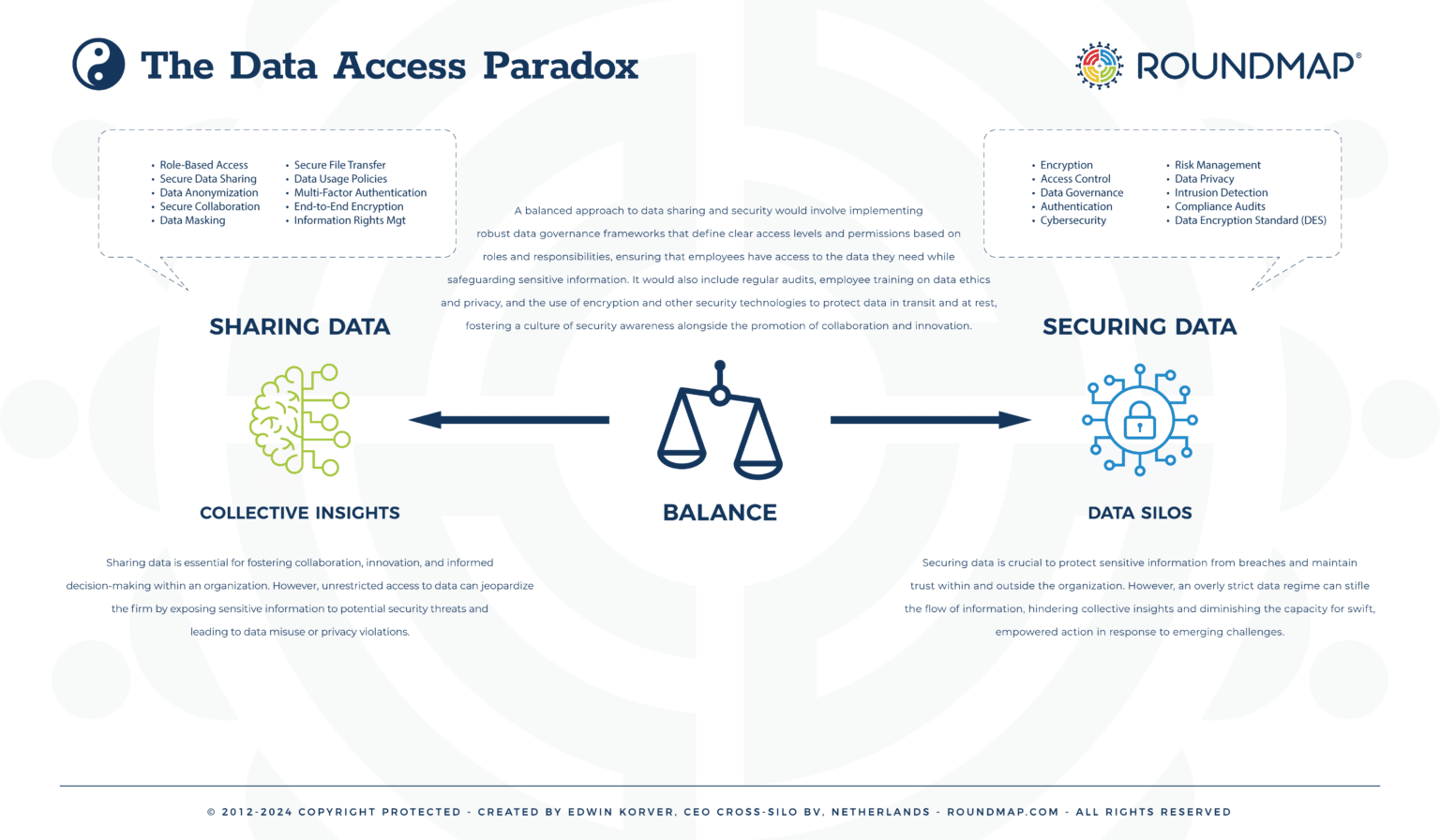The Data Access Paradox highlights a fundamental dilemma in modern business and security operations: the need to keep data secure and private versus the necessity of making this data accessible to facilitate informed decision-making.
This tension arises from the risk of exposing sensitive information through broader access against the backdrop of an increasingly data-driven world where timely and wide-reaching data utilization is critical to operational success and strategic decision-making.
US Army in Irak: Balancing Agility with Security
Amid the Iraq conflict, General Stanley McCrystal faced a critical dilemma that underscores the essence of the Data Access Paradox. Tasked with combating an agile and decentralized Al Qaeda network, McCrystal recognized the urgent need for a shift in strategy. The traditional military hierarchy, with its rigid protocols for information sharing, was ill-suited for the fast-paced, dynamic nature of modern warfare. The general identified a strategic imperative: democratizing data and information across various military teams, enhancing their ability to respond swiftly and effectively to emerging threats.
However, this approach was not without its risks. Opening up access to sensitive information across a broader spectrum of the military posed significant security concerns. There was the ever-present danger that critical intelligence could be compromised, potentially falling into the hands of adversaries. The challenge for McCrystal was to navigate this precarious balance—ensuring that vital information was as accessible as needed to foster rapid decision-making and adaptability on the ground without jeopardizing the security and integrity of military operations.
The decision to democratize information represented a radical departure from conventional military wisdom, marking a transformative moment in modern combat strategy. It was a calculated risk, predicated on the belief that the benefits of enhanced situational awareness and agility outweighed the potential vulnerabilities. This case is a poignant example of the Data Access Paradox in action, highlighting the complex interplay between the need for open information flows and the imperative to safeguard against disseminating sensitive data.
McCrystal's Strategic Considerations
General Stanley McCrystal’s strategic decision to prioritize information sharing within the US Army in Iraq was rooted in a profound understanding of the evolving nature of warfare and the unique challenges posed by insurgent groups like Al Qaeda. Recognizing that the hierarchical and compartmentalized structure of traditional military information flow was a liability in the fast-paced, unpredictable environment of modern conflict, McCrystal embarked on a transformative approach to data democratization.
His thought process was driven by the need for agility and cohesion among dispersed military units facing a decentralized enemy. McCrystal understood that the key to outmaneuvering the insurgents lay in enabling real-time data sharing and communication across all levels of the force. This would speed up decision-making processes and enhance his teams’ overall situational awareness and operational effectiveness.
The considerations leading to this decision involved carefully assessing the risks and benefits. On one hand, there was the undeniable risk of sensitive information potentially being exposed. On the other, the traditional method of restricted information access had proven ineffective against an adversary that thrived in the shadows, leveraging surprise and asymmetry to its advantage. McCrystal weighed these factors, concluding that the potential for increased operational tempo and unity of effort far outweighed the security risks. He bet on trust within the organization, believing that empowering his soldiers with the correct information at the right time was crucial for mission success.
This strategic pivot required a change in operational tactics and a cultural shift within the military—embracing transparency over secrecy and collaboration over compartmentalization. McCrystal’s decision was bold, demonstrating visionary leadership and a deep commitment to adapting military strategies to meet the demands of 21st-century warfare. It was a choice that would not only shape the operations in Iraq but also influence future military doctrines on information sharing and decision-making.
Lessons Learned
General Stanley McCrystal’s decision to prioritize information sharing within the US Army in Iraq marked a pivotal shift in military operations, fundamentally altering how data was managed and utilized on the battlefield.
The outcomes of this strategy were profound, significantly impacting operations and offering valuable lessons for organizational data management, particularly in today’s fast-paced, Volatile, Uncertain, Complex, and Ambiguous (VUCA) world.
Outcomes and Impact on Operations
The immediate effect of democratizing information was a notable increase in the speed and efficiency of military decision-making processes. Units on the ground were better informed, more agile, and could coordinate their efforts more effectively, allowing them to anticipate and counter insurgent activities with unprecedented precision.
This enhanced situational awareness and operational tempo directly contributed to the disruption of enemy tactics and a marked improvement in mission outcomes.
Broader Implications for Organizational Data Management
The success of McCrystal’s approach in a high-stakes military context underscores the critical importance of effective data management and accessibility in any organization. It highlights the need for a cultural shift towards openness and shared responsibility for data, moving away from siloed information and towards a more integrated, collaborative approach.
This is particularly relevant in the face of disruptive technologies, global market dynamics, the rise of artificial intelligence, and evolving business models, all of which demand a more agile and adaptive organizational structure.
Application in the VUCA World
In our VUCA world, where change is the only constant, the lessons from McCrystal’s strategy are increasingly applicable. Disruptive technologies and shifting business models require organizations to be more flexible and responsive than ever.
Democratizing data within an organization can foster innovation, enable rapid response to market changes, and facilitate the development of more effective strategies. However, this also necessitates robust data governance and security measures to protect sensitive information from potential threats.
Integrating artificial intelligence and machine learning into data management processes further amplifies the need for accessible data. AI can provide predictive insights and automate complex decision-making processes, but its effectiveness is contingent upon the quality and accessibility of the data it is fed.
Conclusion
General McCrystal’s strategy in Iraq serves as a compelling case study for the power of information democratization in achieving operational success. As organizations navigate the complexities of the modern business landscape, the principles of strategic data management, informed by the lessons learned from military operations, can provide a roadmap for thriving in a VUCA world. Embracing data democratization while carefully balancing the need for security can empower organizations to remain competitive and resilient in the face of continuous change.
Author
-
Edwin Korver is a polymath celebrated for his mastery of systems thinking and integral philosophy, particularly in intricate business transformations. His company, CROSS/SILO, embodies his unwavering belief in the interdependence of stakeholders and the pivotal role of value creation in fostering growth, complemented by the power of storytelling to convey that value. Edwin pioneered the RoundMap®, an all-encompassing business framework. He envisions a future where business harmonizes profit with compassion, common sense, and EQuitability, a vision he explores further in his forthcoming book, "Leading from the Whole."
View all posts Creator of RoundMap® | CEO, CROSS-SILO.COM






